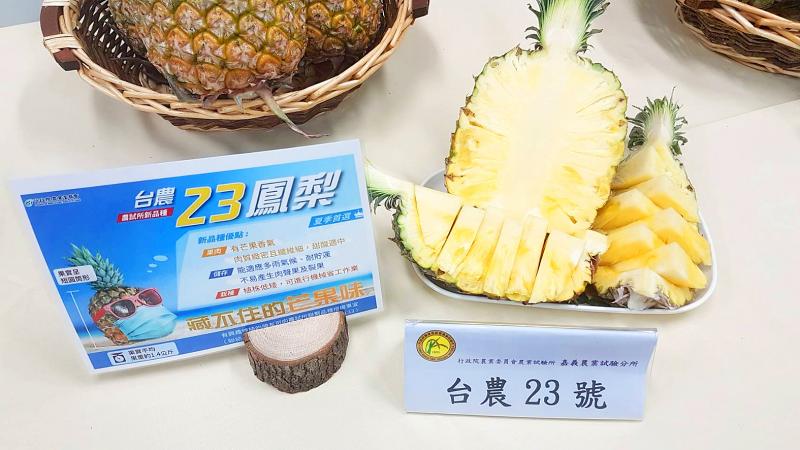The Taiwan Agricultural Research Institute has launched a new pineapple cultivar that smells like a mango and is better adapted to rainy weather, saying it could be a new star of exported fruits.
The new cultivar, named Tainung No. 23, was developed by the institute’s Chiayi Agricultural Experiment Station after 24 years of research.
Bred from two parent pineapple cultivars — Tainung No. 19 and Tainung No. 21 — the new cultivar is better adapted to Taiwan’s rainy environment, station associate researcher Kuan Ching-shan (官青杉) told a news conference in Chiayi City on Friday.

Photo: Ting Wei-chieh, Taipei Times
Due to the nation’s hot and wet summers, many pineapple strains yield poor-quality fruit, which might contain too much moisture, have a weaker flavor or ripen too quickly, the station said, adding that this results in losses for farmers.
The effects of climate change have made the situation worse, it added.
By comparison, the Tainung No. 23 pineapple features a mango smell that would not be affected by the summer weather, with its sweetness and sourness nicely balanced, Kuan said.
Dubbed “mango pineapple” by farmers, the new cultivar’s average sweetness reaches 18.2 degrees, with a sourness of about 0.7 degrees, he said, adding that it tastes delicate and does not have apparent fibers.
According to the Agriculture and Food Agency’s fruit sweetness scale released in 2018, sugar cane for ordinary consumption (not for making sugar) usually has 20 degrees of sweetness, while a quality pineapple should have at least 13 degrees.
Weighing 1.4kg each on average, the new pineapple looks like a short cylinder, and its skin takes on an orange hue when it ripens, Kuan said.
Its plants are relatively short, to help farmers, the station said, adding that farmers should use machines to save on labor when caring for the plants.
Its fruit produced in autumn and winter can be stored longer, making it suitable for exporting, the station said.
The Japanese market has responded positively to the pineapple, station director Chen Kan-shu (陳甘澍) said, adding that farmers interested in growing it can contact the station for authorization.

Taiwan has received more than US$70 million in royalties as of the end of last year from developing the F-16V jet as countries worldwide purchase or upgrade to this popular model, government and military officials said on Saturday. Taiwan funded the development of the F-16V jet and ended up the sole investor as other countries withdrew from the program. Now the F-16V is increasingly popular and countries must pay Taiwan a percentage in royalties when they purchase new F-16V aircraft or upgrade older F-16 models. The next five years are expected to be the peak for these royalties, with Taiwan potentially earning

STAY IN YOUR LANE: As the US and Israel attack Iran, the ministry has warned China not to overstep by including Taiwanese citizens in its evacuation orders The Ministry of Foreign Affairs (MOFA) yesterday rebuked a statement by China’s embassy in Israel that it would evacuate Taiwanese holders of Chinese travel documents from Israel amid the latter’s escalating conflict with Iran. Tensions have risen across the Middle East in the wake of US and Israeli airstrikes on Iran beginning Saturday. China subsequently issued an evacuation notice for its citizens. In a news release, the Chinese embassy in Israel said holders of “Taiwan compatriot permits (台胞證)” issued to Taiwanese nationals by Chinese authorities for travel to China — could register for evacuation to Egypt. In Taipei, the ministry yesterday said Taiwan

‘LIKE-MINDED PARTNER’: Tako van Popta said it would be inappropriate to delay signing the deal with Taiwan because of China, adding he would promote the issue Canadian senators have stressed Taiwan’s importance for international trade and expressed enthusiasm for ensuring the Taiwan-Canada trade cooperation framework agreement is implemented this year. Representative to Canada Harry Tseng (曾厚仁) in an interview with the Central News Agency (CNA) said he was increasingly uneasy about Ottawa’s delays in signing the agreement, especially as Ottawa has warmed toward Beijing. There are “no negotiations left. Not only [is it] initialed, we have three versions of the text ready: English, French and Mandarin,” Tseng said. “That tells you how close we are to the final signature.” Tseng said that he hoped Canadian Prime Minister Mark Carney

POSITIVE DEVELOPMENT: Japan and the US are expected to hold in-depth discussions on Taiwan-related issues during the meeting next month, Japanese sources said The holding of a Japan-US leaders’ meeting ahead of US President Donald Trump’s visit to China is positive news for Taiwan, former Japan-Taiwan Exchange Association representative Hiroyasu Izumi said yesterday. After the Liberal Democratic Party’s landslide victory in Japan’s House of Representatives election, Japanese Prime Minister Sanae Takaichi is scheduled to visit the US next month, where she is to meet with Trump ahead of the US president’s planned visit to China from March 31 to April 2 for a meeting with Chinese President Xi Jinping (習近平). Japan and the US are expected to hold in-depth discussions on Taiwan-related issues during the